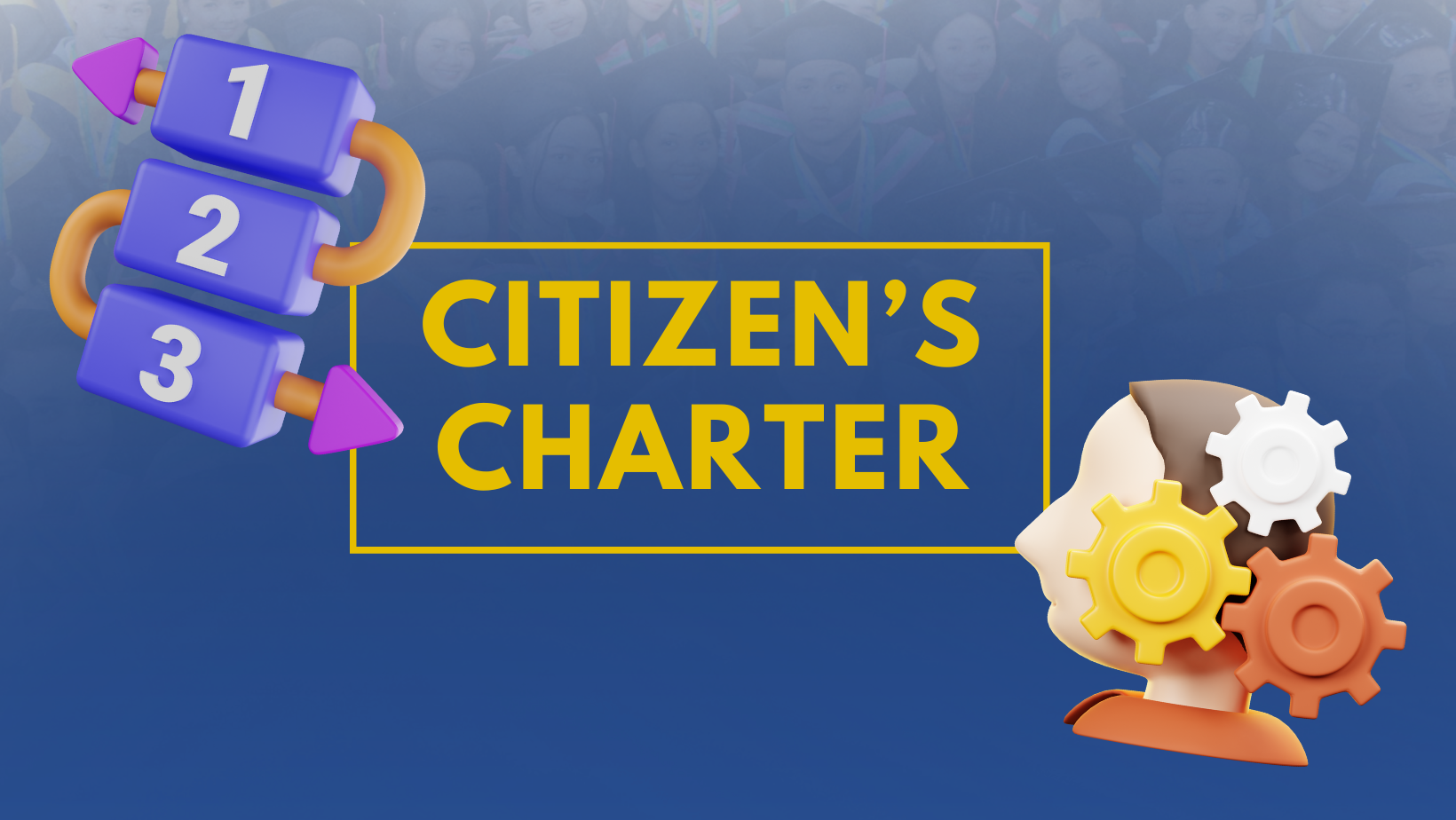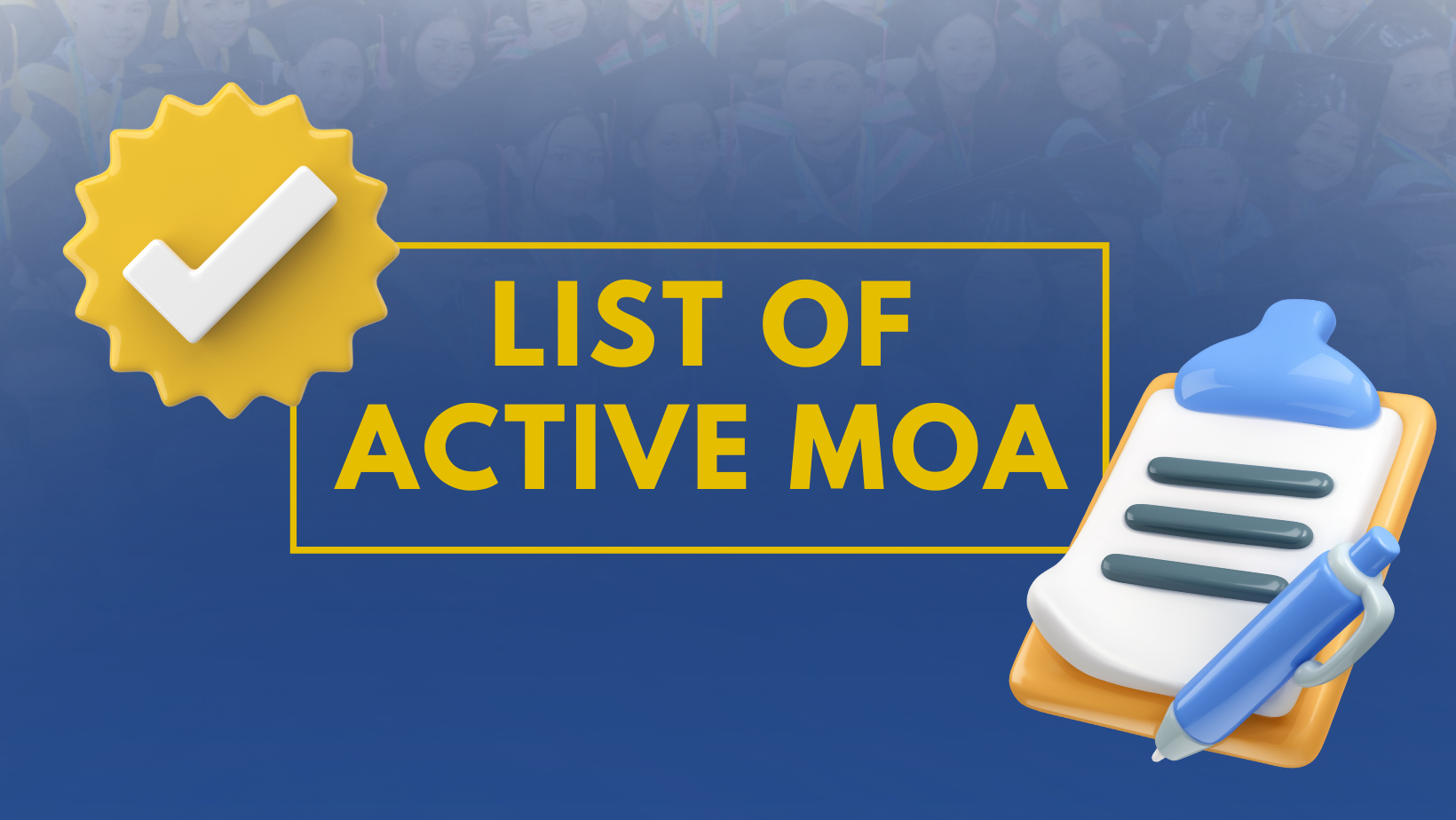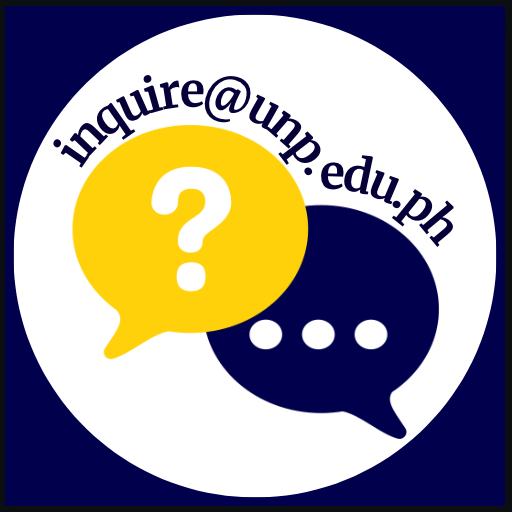Universities play a multifaceted role in the society, nurturing individuals, fostering community bonds, and contributing to national and international progress. They are a cradle where ideas are forged; where diversity is celebrated; and where the seeds of positive change are sown. Universities are indispensable agents of change in the pursuit of the United Nation’s Sustainable Development Goals. Through education, research, community engagement, and advocacy, an academic institution contributes to a more inclusive, equitable, and environmentally conscious global society. It is on this premise that the University of Northern Philippines CaN definitely be a catalyst of change, ignite proactive transformation, and sustain development.
The University of Northern Philippines adheres to the framework that extension services are a synergy of sincere dynamism and action for individual, and communal transfiguration. There is a clear vision that these can drive affect societal transformation, and progress as it present foundations, support, and withstand change and development in tangible, and material forms that are practical and conspicuous.
In pursuit of its goal and objectives, the University steadfastly believes that progress and growth are the complex practice of conveying economic, social, and political change in a community that permits a deep understanding of grassroots’ hopes and desires. It is also community-centered as marginalized and the underserved are capable of voicing and escalating their abilities to organize and develop goods and assets that would bring about a sustained and progressive quality of life. It is further rooted in the perspective that human potential and dignity are first and foremost acknowledged, so that the people in the community would realize and achieve their own social, political, and economic stability.
Lastly, the University of Northern Philippines embodies the principle that change is inexorable giving justification to be promoters of transformation with an integrated objective to serve the community and larger society leading to the substantial and noteworthy improvement of quality of life enclosed with elements of Service oriented-ness, Leadership and Character Building, and above all, the preferment of Cultural Identity.
Universities play a multifaceted role in the society, nurturing individuals, fostering community bonds, and contributing to national and international progress. They are a cradle where ideas are forged; where diversity is celebrated; and where the seeds of positive change are sown. Universities are indispensable agents of change in the pursuit of the United Nation’s Sustainable Development Goals. Through education, research, community engagement, and advocacy, an academic institution contributes to a more inclusive, equitable, and environmentally conscious global society. It is on this premise that the University of Northern Philippines CaN definitely be a catalyst of change, ignite proactive transformation, and sustain development.
The University of Northern Philippines adheres to the framework that extension services are a synergy of sincere dynamism and action for individual, and communal transfiguration. There is a clear vision that these can drive affect societal transformation, and progress as it present foundations, support, and withstand change and development in tangible, and material forms that are practical and conspicuous.
In pursuit of its goal and objectives, the University steadfastly believes that progress and growth are the complex practice of conveying economic, social, and political change in a community that permits a deep understanding of grassroots’ hopes and desires. It is also community-centered as marginalized and the underserved are capable of voicing and escalating their abilities to organize and develop goods and assets that would bring about a sustained and progressive quality of life. It is further rooted in the perspective that human potential and dignity are first and foremost acknowledged, so that the people in the community would realize and achieve their own social, political, and economic stability.
Lastly, the University of Northern Philippines embodies the principle that change is inexorable giving justification to be promoters of transformation with an integrated objective to serve the community and larger society leading to the substantial and noteworthy improvement of quality of life enclosed with elements of Service oriented-ness, Leadership and Character Building, and above all, the preferment of Cultural Identity..
UNP CaN Projects
Anchored on the Sustainable Development Goals, UNP CaN is an umbrella program that gives birth to five priority projects which are:
- Project Baggak (Morning Star) for its Advocacy Services;
- Project Singising (Sunrise) for its Community and Social Services;
- Project Sappuyut (Holistic Care) for its Health and Allied Services;
- Project Saluad (Protect) for its Disaster and Risk Reduction Management Services, and
- Project Dangadang (Surmount for Survival) for its Livelihood and Skills Training, and Food Technology Transfer.
Project Baggak





This Ilokano term Baggak means morning star, shining star invokes awareness, stability, and ingeniousness. From this context, the contextual meaning of Baggak is a source of inspiration as well as aspiration to the programs and activities of the Advocacy Services. In its letter analysis, the term Baggak is translated into:
- B – With ‘B’ as the initial, there is an inclination to get very involved in the lives of other people.
- A – ‘A’ conveys an adventurous attitude, someone who pursues their desires freely.
- G -The ‘G’ disguises a highly empathetic character, the testimony of someone with a particularly feeling-based response as opposed to a realistic and fact-based reaction, in most cases.
- G – As this letter resonates with the energy of the number 7, these people are prone to an interest in spirituality, as well as develop a greater trust in their instincts.
- A – In the case of the ‘A’, there is a wish to train oneself to become a person who can endure difficulties, this being regarded as a life principle to guide by.
- K – In an unbalanced condition, the ‘K’ can grow to be anxious, nervous, and mean.
The university Advocacy pursues to ensure that all people in society are able to have their voice heard on issues that are important to them, protect and promote their rights, save their views and wishes genuinely considered when decisions are being made about their lives and above all empowerment. These aims are anchored on sustainable development goals specifically SDG5 that aims to “achieve gender equality and empower all women and girls”, SDG8 wherein to “promote sustained, inclusive and sustainable economic growth, full and productive employment and decent work for all”, SDG10, “to reduced inequality”, SDG16 “to promote peaceful and inclusive societies for sustainable development, provide access to justice for all and build effective, accountable and inclusive institutions at all levels”, and SDG17 “strengthen the means of implementation and revitalize the global partnerships for sustainable development”. From this lens, Advocacy Services is a process of supporting and enabling people to, express their views, thoughts, and concerns, access information, advice, and guidance, and explore choices and options for services and care. The university therefore moves to dedicate its life to helping people say what they want, secure their rights, represent their interests, and obtain the services they need.
Project Singising




Singising is an Ilocano term that refers to sunrise; a beautiful natural phenomenon that occurs at the start of each new day. It represents new beginnings, inspiring and motivating people in the community to start their day with a positive mindset.
Project Singising is a banner program in community and social services that is based on the concept of a new beginning and the possibility of good change. It attempts to address the sustainable development goals through (17) partnerships, (11) sustainable cities and communities, (8) decent jobs and economic growth, and (4) quality education. These programs include adult education and literacy programs, financial literacy and job training initiatives, community service and volunteer opportunities, environmental conservation and sustainability projects, and youth development and mentoring programs that are offered by all units and colleges at the university.
This initiative signifies a new day, a new beginning, and the chance to make a difference. It seeks to make a good difference in people’s lives and in the community as a whole. In the same way that the sunrise offers light and warmth to the globe, this project attempts to bring light and hope to those in need. It frequently gives individuals and communities with support, resources, and opportunity to prosper and overcome problems. Project Singising lies in its ability to inspire, motivate, and unify individuals, as well as serve as a reminder of the potential for positive change and growth within the community.
Project Sappuyut


“Sappuyut” (Strengthen All People to Protect the Universe Yonder towards Unity and Tenacity – Palakasin ang Lahat ng Tao upang Protektahan ang Sansinukob tungo sa Pagkakaisa at Katatagan)
The word “Sappayut” in Ilokano refers to the provision of health-related necessities, such as promotion, prevention, curative care, and rehabilitation or holistic care. The project’s focus on upholding optimistic views about health that consider various determinants that influence health, including social, spiritual, mental, emotional, physical, and financial aspects. The purpose of this initiative is to unite disparate groups to form a network and collaborate towards fulfilling the community’s and school’s primary need and equipping its members with necessary attitude, skills, and knowledge (ASK) to support the attainment of the Sustainable Development Goal (SDG) 3 “Good Health and Well-being and SDG 2 “Zero Hunger”.
The goals of this project include:
- Promote well-being for all at all ages to enable people to attain optimal health and foster a healthy community by empowering individuals and families.
- Prevent the escalation of communicable and non-communicable illnesses.
- Increase knowledge as well as skills by providing health education and training.
- Enhance their sense of independence and maintain individual’s focal point throughout the recovery process.
Specific objectives of this project to enhance the general health and well-being of people and communities by delivering easily accessible, evidence-based health education and assistance via community outreach and extension initiatives.
Project Saluad




Saluad in the Iloko language represents a concept related to safety and protection. It encompasses a range of ideas and practices aimed at ensuring the well-being, safety and security of individuals, families, and communities within the cultural context of the Ilokano people.
The University of Northern Philippines – University Extension Office on Disaster Risk Reduction and Management (DRRM), in partnership with various academic units including the College of Health Sciences, College of Nursing, College of Criminal Justice Education, College of Arts and Sciences, College of Social Work, and Laboratory Schools, has launched Project Saluad. This comprehensive initiative is designed to enhance the community’s capacity to prevent, respond to, and recover from disasters. The project encompasses a range of interconnected goals and objectives based on the Sustainable Development Goals on sustainable cities and communities, climate action, partnership for the goals and gender equality.
The objectives of the PROJECT SALUAD are as follows:
1: Strengthening Community Resilience
Central to the essence of Project Saluad lies a steadfast dedication to endow the community with the capacity to endure and overcome challenges. The project incorporates a variety of initiatives, including enhancing key infrastructure and delivering training in emergency response and preparedness. One fundamental aspect of this purpose involves cultivating a culture of awareness and education among community members, thereby promoting a shared sense of responsibility for ensuring safety.
2: Early Warning and Response Systems (EWRS)
Project Saluad prioritizes the implementation of early warning systems and prompt reaction procedures. The objective of implementing efficient early warning systems is to ensure the prompt dissemination of alerts and the activation of community response mechanisms in anticipation of impending disasters. The provision of training to local leaders and community people in emergency response methods will facilitate a well-coordinated and expeditious response during critical situations.
3: The Implementation of Sustainable Environmental Practices
Project Saluad is committed to advocating for sustainable environmental practices in order to mitigate the likelihood of disasters and save the natural resources of the community. Various measures can be used to address environmental concerns such as erosion and floods prevention through soil and water conservation, enhancing natural disaster resilience via reforestation efforts, and promoting sustainable land-use practices. These practices are in accordance with a dedication to protecting the environment while mitigating the risks associated with disasters.
4: Enhancing Collaborative Relationships and Governance
The achievement of efficient disaster risk reduction and management requires a collective effort. Project Saluad aims to facilitate collaborations between Local Government Units (LGUs), non-governmental organizations (NGOs), and National Government Agencies (NGAs). The implementation of information sharing, coordination efforts with neighboring communities, and the establishment of community disaster risk reduction committees will facilitate a collaborative approach to disaster management. The formulation and implementation of policies and regulations will establish a comprehensive structure for efficient governance in the locality susceptible to disasters.
5: Disaster Preparedness and Response Training
One of the project’s main objectives is to equip community members with the knowledge and skills required for effective disaster response. This involves providing first aid and medical training, fire safety and rescue training, and education on the importance of disaster kits and emergency plans. By building a community of trained responders, Project Saluad ensures that lives are saved in times of crisis.
6: Developing Livelihoods with Enhanced Resilience to Disasters
Project Saluad is centered around the fundamental principles of sustainability and resilience. With this objective in mind, our purpose is to provide assistance in the establishment of sustainable livelihoods that are resilient to the adverse effects of both natural disasters and economic downturns. This objective will be supported by the promotion of varied livelihoods, the provision of training in income-generating activities that are resilient to disasters, and the facilitation of access to microfinance and insurance choices.
Project Saluad of the University Extension Office – Disaster Risk Reduction and Management provide the necessary technical engagement and assistance to the LGUs, NGAs, and NGOs along with emergency responses in cases of natural and human-induced hazards in the service area. In addition, it is expected to provide extension services along with disaster preparedness and orientation and training on DRRM in the locality.
PROGRAMS AND PROJECTS PER ACADEMIC UNIT
OFFICE OF THE PRESIDENT
-
University of Northern Philippines
3rd Floor- Admin Building, Tamag, Vigan, Ilocos Sur - (077) 644-2261
- op@unp.edu.ph
Registrar's Office
- registrar@unp.edu.ph
- UNP Registrar's Office
Admission Services
- admissionservices@unp.edu.ph
- UNP Admission Services
Public Information Office
- pioffice@unp.edu.ph
- University of Northern Philippines
Guidance and Counseling Services
- guidance@unp.edu.ph
- University of Northern Philippines


